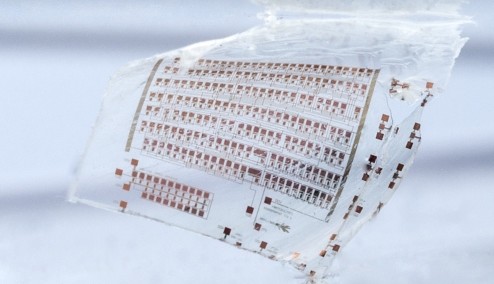Ultra Low Power Chips
on

At the IEEE International Electron Devices Meeting (IEDM) 2014 held in San Francisco last week the laboratory for advanced research in microelectronics (Imec) announced they had designed an 8-bit RFID transponder chip that used so little power it could run for 20 years on a single AAA battery. If predictions about the interconnectivity of all ‘things’ in the future are to be realized then it will be necessary to optimize the design of sensors and electronics so that they do their job using as little energy as possible.
With a process involving the use of thin-film transistor technology (TFTs) on plastic film, the team at Imec have fabricated an 8-bit transponder chip which can operate at a supply voltage of 0.55 V while consuming only 2.5 µW. This means that a typical AAA battery could power the chip for more than 20 years (assuming self-discharge doesn't get there first). In addition to its low power needs it is processed on a 25 µm thin foil in a process flow compatible to a commodity manufacturing infrastructure (flat panel display fabs) so that it also addresses the issue of cost and mechanical flexibility, thinness and robustness. Chips made using this process can be embedded in security documents, smart packaging, disposable electronics or textiles.
The research has been carried out in the framework of Holst Centre’s (initiated by imec and TNO) industrial affiliation program of thin-film electronics and with support from the EU through the project COSMIC that develops complimentary thin film circuit technologies on foil for applications like gate driver for flexible displays, ADC, ALU and RFID tags.


Discussion (0 comments)